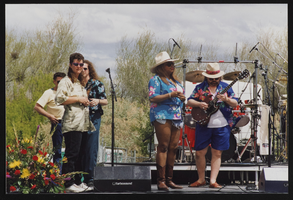Search the Special Collections and Archives Portal
Search Results
Raul Daniels oral history interview
Identifier
Abstract
Oral history interview with Raul Daniels conducted by Maribel Estrada Calderon on July 03, 2019 for the Latinx Voices of Southern Nevada Oral History Project. In this interview, Daniels discusses his childhood memories of Cuauhtémoc, Mexico and later moving to Las Vegas, Nevada with his family in 1989. He talks about his father’s employment in construction and joining the painters union. Daniels then recalls attending Las Vegas High School, receiving his citizenship, and his experiences attending the University of Nevada, Las Vegas. Daniels describes learning about The LGBTQ Center of Southern Nevada, studying international business, his employment at Neiman Marcus, and eventually becoming the Vice President of Catering with Station Casinos. Later, Daniels discusses what The Center meant to him as a gay teen and being a member of the Student Organization of Latinos (SOL). Lastly, Daniels recalls going through the adoption process for his son and talks about Aids for Aids Nevada (AFAN).
Archival Collection
Gay and Lesbian Community Center of Southern Nevada Photograph Collection
Identifier
Abstract
The Gay and Lesbian Community Center of Southern Nevada Photograph Collection contains mainly candid photographs of events and individuals affiliated with the Las Vegas-based Gay and Lesbian Community Center of Southern Nevada (GLCCSN) dating from 1993 to 2000. Photographs depict events honoring prominent members of the gay, lesbian, bisexual, transgender, and queer community; meetings at GLCCSN; and candidate nights for members of the community running for public office. The collection also includes a number of photographs of the Freedom to Marry celebration at the GLCCSN and the Gay Pride Las Vegas festival from 1998 to 1999.
Archival Collection
Gay Info Nationwide booth at Gay Pride: photographic print, 1998
Level of Description
Archival Collection
Collection Name: Dennis McBride Photograph Collection
Box/Folder: Folder 038
Archival Component
Monroe Williams oral history interview
Identifier
Abstract
Oral history interview with Monroe Williams conducted by Claytee D. White on August 15, 2000 and August 22, 2000 for the Boyer Early Las Vegas Oral History Project. In this interview Monroe Williams discusses moving to Las Vegas, Nevada in 1943, living in the historical Westside neighborhood, and being one of the first black fire fighters in Las Vegas. He also talks about being involved with the National Association for the Advancement of Colored Peoples (NAACP), being in the Navy for two years, and his real estate and property management companies.
Archival Collection
Mary Wesley oral history interview
Identifier
Abstract
Oral history interview with Mary Wesley conducted by Claytee D. White on October 22, 2007 for the UNLV University Libraries Oral History Collection. In this interview, Wesley discusses her early life in Quitman, Mississippi. She recalls the racism she experienced during her youth, the church community in Quitman, and traveling to Las Vegas, Nevada by train. She talks about the welfare rights movement in Las Vegas, Operation Life, and businesses on Jackson Street. Lastly, Wesley describes the entertainment on the Westside, and integration on the Las Vegas Strip.
Archival Collection
Sidney Lowe oral history interview
Identifier
Abstract
Oral history interview with Sidney Lowe conducted by Claytee D. White on January 22, 2013 for the Boyer Early Las Vegas Oral History Project. Lowe begins the interview by discussing her upbringing in Alabama and South Carolina and her experiences with racial segregation and discrimination. She continues, describing places she has lived, her relationship with the father of her children, and moving to Las Vegas, Nevada in 1982. Lowe talks about life in Las Vegas during the 1980s, obtaining a position in the James R. Dickinson Library at the University of Nevada, Las Vegas (UNLV) as a library assistant, and her education. Lowe concludes by discussing her career working for the UNLV library system and the library's function on campus.
Archival Collection

Musical group performing at Gay Pride: photographic print
Date
Archival Collection
Description
Image
Earl G. Heron oral history interview
Identifier
Abstract
Oral history interview with Earl G. Heron conducted by Claytee D. White on November 22, 2024 for the African Americans in Las Vegas: a Collaborative Oral History Project. Heron recalls his childhood in Queens, New York, where he learned automobile mechanics from his father. He used that knowledge to become a mechanic on fighter planes for the United States Air Force. Heron was stationed for some time at Nellis Air Force Base in Las Vegas, Nevada. He also was stationed in San Antonio, San Bernadino, Wichita Falls, and Fort Bragg. He became a flight engineer and took part in Red Flagg War Games Training while stationed at Nellis AFB. Digital audio available; no transcript available.
Archival Collection
Robert Maheu oral history interview
Identifier
Abstract
Oral history interview with Robert Maheu conducted by K. J. Evans on April 19, 1999 for the Las Vegas Review-Journal First 100 Oral History Project. In this interview, Maheu discusses Howard Hughes and attempts by Bill Gay and associates to take Hughes' business. Maheu then discusses his career in the FBI and CIA before moving to Las Vegas, Nevada. Finally, Maheu talks about working for Hughes.
Archival Collection
Kenneth W. Fong oral history interview
Identifier
Abstract
Oral history interview with Kenneth W. Fong conducted by Lois Goodall on February 22, 2014 for the West Charleston Neighborhoods--an Oral History Project of Ward 1. Fong discusses growing up in Las Vegas, Nevada and being the son of two successful and philanthropic community members, Wing and Lilly Fong. Fong also discusses his father starting a grocery store and later in 1955, Fong’s Garden. He then discusses real estate development, Nevada State Bank development, as well as contributing to the University of Nevada, Las Vegas and the Chinatown evolution.
Archival Collection
